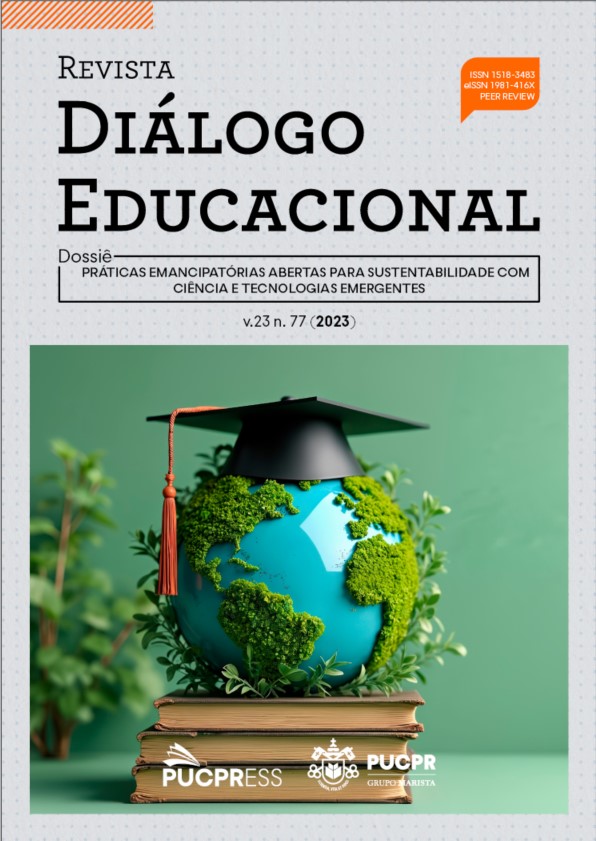Nature in Goethe
A constitutive source of human formation
DOI:
https://doi.org/10.7213/1981-416X.23.077.AO05Abstract
For Goethe, nature plays a decisive role in human formation. The German poet has a monist worldview of reality, considering that there is no matter without spirit and spirit without matter, opposing, therefore, the mechanistic, fragmentary and manipulative vision expressed in the scientific vision of modernity. The unity between nature and spirit plays a nodal role in his theory, since he starts from the understanding of the world in a comprehensive and totalizing way. Because of this, interaction with nature cannot be ignored or understood as a manipulative action of the subject over it. Knowledge is born from the reciprocal interrelation between subject and nature, and the formation of the human being depends on the participatory procedure that involves the intense and sensitive interaction with it. To this end, the poet states that it is necessary to develop a creative and critical reflexivity about the developing experience. He considers that Urform, the basic form from which all things originate, belongs to nature, thus bringing an important and challenging contribution to a revision of the relationship between nature and human formation. The rescue of Goethe's understanding of nature implies in discussing the very concept of human being that is implicit in his studies and in his art.
Downloads
References
ANDRADE, A. M. Aspectos da Natureza no Romantismo: um recorte crítico. A Palo Seco, v. 8, n. 8, p. 39-46, out. 2016.
ANGIONI, Lucas. Sobre a definição de natureza. Revista Kriterion, Belo Horizonte, v. 51, n. 122, jul./dez. 2010.
ARISTÓTELES. Metafísica. São Paulo: Loyola, 2002.
BACH JUNIOR, J. As cores fisiológicas na ciência de Goethe: educação e fenomenologia. Revista Ciência, Educação, Bauru, UNICAMP, v. 22. n. 1. p. 117- 128, 2016.
BORNHEIM, Gerd A. Os filósofos pré-socráticos. São Paulo: Editora Cultrix, 1977.
BURTT, E. A. As Bases metafísicas da Ciência Moderna. Brasília, DF: Universidade de Brasília, 1983.
GIANNOTTI, Marco. Cor e linguagem: uma gramática das cores. Blog José Maria Dias da Cruz. São Paulo, 21 de janeiro de 2017. Disponível em: http://josmariadiasdacruz.blogspot.com/2017/01/cor-e-linguagem-uma-gramatica-das-cores.html. Acesso em: 21 out. 2022.
GOETHE, Johann Wolfgang von. Memórias. Rio de Janeiro: José Olympio, 1948.
GOETHE, Johann Wolfgang von. Máximas e reflexões. Lisboa: Guimarães Editores, 1987.
GOETHE, Johann Wolfgang von. Os anos de aprendizado de Wilhelm Meister. São Paulo: Editora 34, 2006.
GOETHE, Johann Wolfgang von. As afinidades eletivas. São Paulo, Nova Alexandria, 2008.
GOETHE, Johann Wolfgang von. Os sofrimentos do jovem Werther. São Paulo: Estação Liberdade, 2009.
GOETHE, Johann Wolfgang von. Ensaios científicos: uma metodologia para o estudo da natureza. São Paulo: Barany Editora: Ad Verbum Editorial, 2012.
GOETHE, Johann Wolfgang von. Doutrina das cores. 4 ed. São Paulo: Nova Alexandria, 2013.
GOETHE, Johann Wolfgang von. Fausto: uma tragédia (Primeira parte). São Paulo: Editora 34, 2014.
HADOT, P. O Véu de Ísis. São Paulo: Edições Loyola, 2004.
HERÁCLITO. Fragmentos. In: BORNHEIM, Gerd. Os Filósofos pré-socráticos. São Paulo: Cultrix, 1977.
HERDER, J. H. Obra Selecta. Madrid: Alfaguara, 1982.
IBAIXE JR., João. Os pré-socráticos e a phisys: o problema da natureza no pensamento dos pré-socráticos. Tales de Mileto, Anaximandro e Anaxímenes. Revista Filosofia, n. 26, p. 22-25, nov. 2010.
LÖWITH, Karl. De Hegel a Nietzsche. La quiebra revolucionaria del pensamiento en el siglo XIX. Madrid-Espanha: Katz Editora, 2008.
MAAS, Wilma Patrícia. O cânone mínimo: o Bildungsroman na história da literatura. São Paulo: Editora UNESP, 2000.
MAAS, Wilma Patrícia. Filosofia da natureza e pensamento estético em Goethe. Discurso, São Paulo, v. 1, n. 42,
p. 117-138, 2013.
MERLEAU-PONTY, Maurice. Fenomenologia da Percepção. 2. ed. São Paulo: Martins Fontes, 1999.
MONTAIGNE, Michel de. Ensaios. São Paulo: Editora 34, 2016.
NADLER, Steven. Tudo o que é, é Deus: substância e coisas na metafísica de Spinoza. In: HUENEMANN, Charlie. Interpretando Espinoza – Ensaios críticos. São Paulo: Madras, 2010.
PIAZZA, Pier Vincenzo. Homo Biologicus: como a biologia explica a natureza humana. Rio de Janeiro: Bertrand Brasil, 2021.
POLITO, Antony Marco Mota; FILHO, Olavo Leopoldino da Silva. A Filosofia da Natureza dos Pré–Socráticos. Cad. Bras. Ens. Fís., v. 30, n. 2: p. 323-361, ago. 2013.
PREVOSTI MONCLÚS, Antoni. La naturaleza humana en Aristóteles. Espíritu: Cuadernos del Instituto Filosófico de Balmesiana, ano 60, n. 141, p. 35-50, 2011.
SPINOZA, Benedictus de. Ética. Belo Horizonte: Autêntica Editora, 2010.
TAYLOR, Charles. As fontes do self: a construção da identidade moderna. 2. ed. São Paulo: Loyola, 2005.
WULF, Andrea. A invenção da natureza. São Paulo: Planeta, 2016.
Downloads
Published
How to Cite
Issue
Section
License
Copyright (c) 2023 Editora Universitária Champagnat

This work is licensed under a Creative Commons Attribution 4.0 International License.
O(s) autor(es) transfere(m), por meio de cessão, à EDITORA UNIVERSITÁRIA CHAMPAGNAT, pessoa jurídica de direito privado, inscrita no CNPJ/MF sob o n.º 76.659.820/0009-09, estabelecida na Rua Imaculada Conceição, n.º 1155, Prado Velho, CEP 80.215-901, na cidade de Curitiba/PR, os direitos abaixo especificados e se compromete a cumprir o que segue:
- Os autores afirmam que a obra/material é de sua autoria e assumem integral responsabilidade diante de terceiros, quer de natureza moral ou patrimonial, em razão de seu conteúdo, declarando, desde já, que a obra/material a ser entregue é original e não infringe quaisquer direitos de propriedade intelectual de terceiros.
- Os autores concordam em ceder de forma plena, total e definitiva os direitos patrimoniais da obra/material à EDITORA UNIVERSITÁRIA CHAMPAGNAT, a título gratuito e em caráter de exclusividade.
- A CESSIONÁRIA empregará a obra/material da forma como melhor lhe convier, de forma impressa e/ou on line, inclusive no site do periódico da EDITORA UNIVERSITÁRIA CHAMPAGNAT, podendo utilizar, fruir e dispor do mesmo, no todo ou em parte, para:
- Autorizar sua utilização por terceiros, como parte integrante de outras obras.
- Editar, gravar e imprimir, quantas vezes forem necessárias.
- Reproduzir em quantidades que julgar necessária, de forma tangível e intangível.
- Adaptar, modificar, condensar, resumir, reduzir, compilar, ampliar, alterar, mixar com outros conteúdos, incluir imagens, gráficos, objetos digitais, infográficos e hyperlinks, ilustrar, diagramar, fracionar, atualizar e realizar quaisquer outras transformações, sendo necessária a participação ou autorização expressa dos autores.
- Traduzir para qualquer idioma.
- Incluir em fonograma ou produção audiovisual.
- Distribuir.
- Distribuir mediante cabo, fibra ótica, satélite, ondas ou qualquer outro sistema que permite ao usuário realizar a seleção da obra ou produção para recebê-la em tempo e lugar previamente determinados por quem formula a demanda e nos casos em que o acesso às obras ou produções se faça por qualquer sistema que importe em pagamento pelo usuário.
- Incluir e armazenar em banco de dados, físico, digital ou virtual, inclusive nuvem.
- Comunicar direta e/ou indiretamente ao público.
- Incluir em base de dados, arquivar em formato impresso, armazenar em computador, inclusive em sistema de nuvem, microfilmar e as demais formas de arquivamento do gênero;
- Comercializar, divulgar, veicular, publicar etc.
- Quaisquer outras modalidades de utilização existentes ou que venham a ser inventadas.
- Os autores concordam em conceder a cessão dos direitos da primeira publicação (ineditismo) à revista, licenciada sob a CREATIVE COMMONS ATTRIBUTION LICENSE, que permite o compartilhamento do trabalho com reconhecimento da autoria.
- Os autores autorizam a reprodução e a citação de seu trabalho em repositórios institucionais, página pessoal, trabalhos científicos, dentre outros, desde que a fonte seja citada.
- A presente cessão é válida para todo o território nacional e para o exterior.
- Este termo entra em vigor na data de sua assinatura e é firmado pelas partes em caráter irrevogável e irretratável, obrigando definitivamente as partes e seus sucessores a qualquer título.
- O não aceite do artigo, pela EDITORA UNIVERSITÁRIA CHAMPAGNAT, tornará automaticamente sem efeito a presente declaração.













